Too Much Dielectric Grease on Spark Plugs: Consequences Results
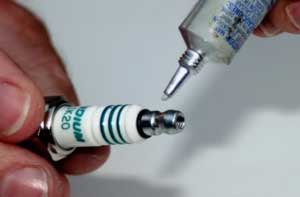
If your car’s engine is sounding like it needs a tune-up, the chances are high that dielectric grease is the culprit.
Dielectric grease is a type of oil that’s used to help insulate electrical systems and improve performance.
Unfortunately, too much dielectric grease on spark plugs becomes coated with the oil, which can lead to misfiring and decreased engine performance.
While dielectric grease is wonderful for use on electric outlets since it does not carry electricity and creates a water-tight seal, it is unnecessary to use too much of it.
What Is Spark Plug Grease?
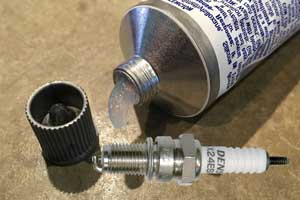
Spark plug grease isn’t a need in the automobile world like coolant or oil, but it’s a popular commodity in garages throughout the nation.
Dielectric grease, which is most typically used on battery connections lightbulbs, and spark plug boots, in principle, a protectant similar to automobile wax.
It is not essential, but it may assist in prolonging and preserving the longevity and your car’s quality and its components.
Spark plug grease is only one of many various types of fluids located mostly around your automobile, each of which serves a specific purpose.
If you decide to buy any dielectric grease, it cannot be used alternately with wheel bearings grease.
How To Use Dielectric Grease?
Dielectric grease is a type of lubricant that is used to reduce friction and wear in devices that move around a lot, like fans, motors, and pumps.
It is also used in a variety of other applications where smooth, low-friction operation is desired.
- Pull Out A Spark Plug Boot.
- Wipe the spark plug and the boot of the plug.
- Squeeze a little amount of dielectric grease onto a piece of cardboard.
- Apply a small quantity of dielectric grease all around the interior wall of the spark plug boot using a cotton swab.
- Replace the plug boot, and you’re ready to go.
Is Dielectric Grease Necessary For Spark Plugs?
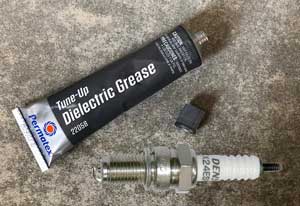
Dielectric grease is not required for spark plugs, but it could help extend and maintain the life and quality of your vehicle and its parts.
Dielectric grease is a type of oil that helps to keep the electrical insulation between the wires in the spark plug in good condition.
This is important because if the insulation breaks down, it can create sparks that can damage the plug and the engine.
So why do you need to use this kind of lubricant if the spark plugs are not made from materials that can be damaged by electricity?
Electric sparks could affect the insulating ability of metals, but this is only possible when they’re extremely hot.
When electric current flows through a sparking cable, it produces heat in the metal sufficiently high enough for internal corrosion to take place and destroy its lubricating properties.
Dielectric grease actually increases electrical resistance within parts like spark plugs so that electric current would have fewer chances of causing the components inside them damage.
Using dielectric grease keeps everything nice and tidy so that the engine will run smoother and longer. If you don’t have dielectric grease, an oil-based lubricant can be used in its place.
Where To Put Dielectric Grease On Spark Plugs
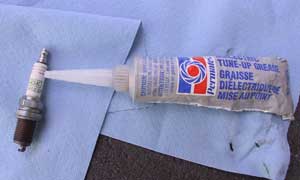
Dielectric grease can be applied to any metal surface within the engine bay. It’s most commonly used on spark plugs, but it can also be used on cables, hoses, and other metal parts that come in contact with high-voltage electricity.
When placing the grease, this should be done in a way that it doesn’t get on electrical parts like wires and cables. Most dielectric greases are sold in tubes with an applicator, so they’re easy to apply.
You could also use your own paper towel if you want to put less friction against the surface within which it’s being applied as well.
Once applied, take care not to leave any excess oil because otherwise, things will get dirty and cause potential issues for expensive electronics inside your vehicle.
If too much oil gets where you don’t want them going, clean up damage as needed with a degreaser or brake cleaner.
When should you not use dielectric grease?
Here’s when you should not use dielectric grease:
1. When you need to make an electrical connection. Dielectric grease is an insulator, so it will prevent electricity from flowing freely between two conducting surfaces.
2. When you need a sealant or adhesive. Dielectric grease is designed to be a lubricant, not an adhesive or sealant.
3. When you need to lubricate plastic or rubber. Dielectric grease is designed to lubricate metal surfaces, so it should not be used on plastic or rubber parts.
4. When you need to lubricate an electrical component. Dielectric grease should not be used to lubricate electrical components as it can interfere with the electrical current.
Tip Of Spark Plug Broke Off Without Damaging Your Car
Spark Plug Grease Necessary
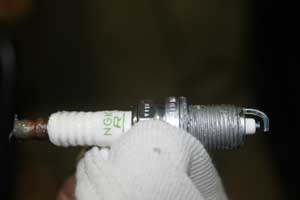
Spark plug grease is not necessary, but it could help extend and maintain the life and quality of your vehicle and its parts.
This may not seem like a big deal, but neglect can lead to decreased performance and potential problems over time.
Grease specifically designed for spark plugs helps reduce friction, which helps prevent fouling and misfires. In addition, it can also improve engine performance and longevity.
While spark plug grease is not necessary, it is a good practice to use it from time to time to help keep your vehicle running smoothly.
If you do experience problems, ensure to check the level and condition of your spark plug grease to determine if it is necessary to replace it.
Can Bad Spark Plugs Cause Knock Sensor Code?
Can Dielectric Grease Cause Misfire
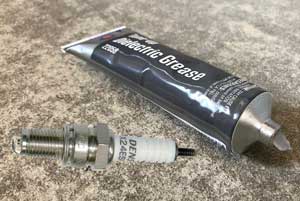
Dielectric grease is a type of oil that is used in electrical equipment to reduce friction and keep components running smoothly.
Some people may be concerned that dielectric grease may cause misfires in electronic equipment, but this is not the case.
Dielectric grease is not a combustible substance, meaning it will not cause fires when it’s used in electrical equipment.
In fact, dielectric grease has been proven to be safe to use and does not pose any health risks when it’s used under inappropriate conditions.
How To Clean Off Dielectric Grease?
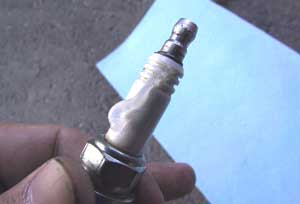
Dielectric grease is a type of oil that is used to coat electrical parts. It is often left on electrical components due to the fact that it can help prevent corrosion.
Unfortunately, dielectric grease can sometimes be difficult to remove, particularly if it has been heavily applied. Here are a few methods that may help you clean off dielectric grease:
1. Use a degreaser
A degreaser like acetone can be effective at cleaning off dielectric grease. Just ensure to wear gloves and eye protection when using this method.
2. Use boiling water
Boiling water can also be effective at cleaning off dielectric grease. Just ensure to avoid getting it in your eyes or on your skin.
3. Use a commercial cleaner
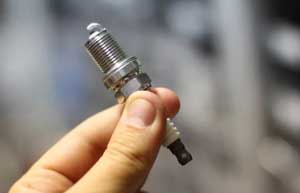
Some commercial cleaners are specifically designed for removing dielectric grease. Just ensure to read the instructions carefully before use.
4. Use a wax stripper
A wax stripper like Paraffin Wax Stripper can also be effective at removing dielectric grease. Just ensure to wear gloves and protect your skin from the heat of the stripper.
5. Use a scrubber
A scrubber like Mohawk’s Glass Scrubber can also be helpful in cleaning off dielectric grease. Just ensure to avoid getting it in your eyes or on your skin.
How Much Dielectric Grease To Use?
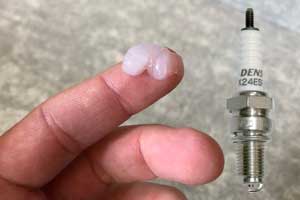
There is no one answer to this question as dielectric grease is highly specific to the needs of the application. That said, here are a few general guidelines to help you get started:
1. Start with a small amount and add more as needed
Dielectric grease is a very viscous compound, so start with a small amount and add more as needed until you achieve the desired results.
2. Use a non-corrosive solvent
Dielectric grease is incompatible with many common solvents, so use a non-corrosive solvent such as mineral spirits or xylene to dilute it before use.
3. Apply it slowly and carefully
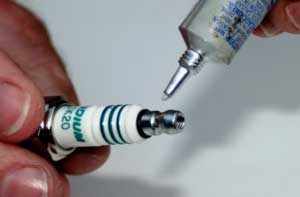
Dielectric grease is sensitive to moisture and heat, so ensure to carefully apply it to avoid damage to your equipment or the surrounding environment.
4. Clean the excess off
Once you’ve achieved the desired results, clean the excess dielectric grease off your equipment with a solvent or a wax stripper.
Dielectric Grease Cleaner
Check price CRC INDUSTRIES DIELECTRIC GREASE
Package Dimensions: it is perfect for cleaning all types of electric equipment and machinery. This cleaner is a powerful degreaser and lubricant that can be used on all metals, plastics, and rubber. It is also effective at removing greases, oils, and other residues.
Spark Plug Grease Alternative
To lubricate faucet stems, the Permatex Dielectric Tune-Up Grease is great for spark plug, valves, bulbs and cartridges when fixing a leaking faucet.

This Grease minimizes friction, offers long-lasting lubricant, and aids in the smooth operation of faucets with critical turning. This grease is resistant to oxidation and may be applicable terms of ceramic.
How long does dielectric grease last?
The answer is essentially forever. Dielectric grease does not break down or degrade over time, which means it can provide long-term electrical protection for years.
What happens if I don’t grease my spark plugs?
The spark plugs can become corroded or contaminated, leading to thread breakage. This can happen when the spark plug becomes too hot and the lubricant evaporates. The spark plug threads can expand and break off without lubrication, leading to engine misfires and decreased performance.
Why do people use dielectric grease?
There are many reasons why people use dielectric grease. One of the primary reasons is to ensure longevity of electrical connections. Dielectric grease forms an airtight seal around electrical connectors, blocking out moisture, dust and other contaminants that can lead to corrosion and other problems. The grease also helps to reduce friction between the connectors and conductors, reducing the amount of energy lost during transmission.
Can you touch dielectric grease?
The answer is generally yes – although you should always practice caution and use protective gear to avoid skin irritation and any potential health risks. Even though most dielectric grease products are safe to touch, due to the presence of corrosive and potentially hazardous material such as lead and cadmium, it is generally recommended that you wear protective gloves and/or breathing masks when handling dielectric grease.
Will dielectric grease damage rubber?
The answer is yes, dielectric grease can, unfortunately, damage rubber. Dielectric grease is petroleum based, meaning that it is primarily composed of mineral oils, paraffin waxes, and other hydrocarbons. When applied to rubber, these compounds can cause the rubber to soften, swell, and even crack depending on how long it is exposed to the grease. This is especially true when dielectric grease comes into contact with certain types of rubber, like EPDM.
Frequently Asked Questions
1. What happens if you get dielectric grease on spark plugs?
If you get dielectric grease on spark plugs, removing it is unnecessary. In fact, it could actually help to extend and maintain the life and quality of your vehicle and its parts.
This is a type of synthetic grease that helps to reduce friction and prevent corrosion. It is also recommended for use on other critical engine parts, such as camshafts, valves, and bearings.
2. Will too much dielectric grease cause a misfire?
There is no truth to the myth that too much will cause a car to misfire. This is an important lubricant, and excessive amounts can actually help reduce friction and improve engine operation.
However, if you experience a problem with your car due to dielectric grease, consult with a mechanic for further assistance.
3. Can too much dielectric grease cause a short?
No. This is not a lubricant that causes parts to wear down or fail prematurely. In fact, it can actually help prolong the life of critical engine parts.
However, overexposure to dielectric grease may cause corrosion and build-up on metal surfaces. So always use caution when using this type of grease and take proper precautions, such as wearing eye protection, when working with high-powered tools.
4. How do you remove dielectric grease from spark plugs?
Spark plugs need to be cleaned regularly in order to prevent corrosion and possible engine damage. One method is to use a mineral spirits solution to dissolve the dielectric grease that forms on the plugs.
Mineral spirit is a type of alcohol, and it is effective in dissolving dielectric grease. It is also safe to use, not damaging the plugs.
5. Should you apply dielectric grease to spark plugs?
Yes, you should apply dielectric grease to spark plugs. This is a lubricant that helps to reduce friction and heat build-up in engines and other mechanical devices.
It is also effective in preventing sparks from igniting, which can result in a fire. In addition, dielectric grease helps prevent the build-up of dirt and grime on spark plugs, which can reduce the plug’s lifespan.
6. What happens if you put too much dielectric grease?
Applying a heavy layer of dielectric grease will make it hard to fully insert the sockets. Furthermore, since grease does not transmit electricity, the absence of contact will very certainly prohibit your automobile from starting.
If your automobile won’t start after you’ve greased the spark plugs, wipe them out with cotton swabs and then re-set everything before starting it.
7. How to grease a spark plug boot?
First, Pull out a spark plug boot. Then wipe the spark plug and the boot of the plug. Now, squeeze a little amount of dielectric grease onto a piece of cardboard.
Apply a small quantity of dielectric grease all around the interior wall of the spark plug boot using a cotton swab.
8. How do you use dielectric grease for a tune up?
Dielectric grease can be used during a tune-up to help loosen dirt and grime from various areas of your engine.
Additionally, thesis an effective lubricant that will reduce friction in vital engine parts. Using dielectric grease during a tune-up lets you ensure that your engine runs smoothly and without any damaging mishaps.
Conclusion
Too much dielectric grease on spark plugs can cause problems with the ignition system. This greasy substance can prevent the plugs from heating up properly, which can cause the engine to stop running.
If you notice any of these problems, it’s important to get the plugs cleaned and checked by a mechanic. This will ensure that the car starts and drives properly.


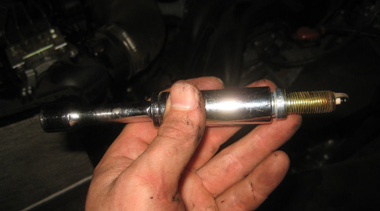
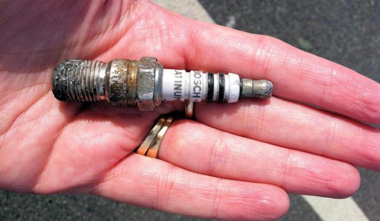
![Best Spark Plugs for RX8 Reviews in 2023 [Excellent Rotary Engine]](https://torqueadvisor.com/wp-content/uploads/2021/06/Best-Spark-Plugs-For-RX8.jpg)
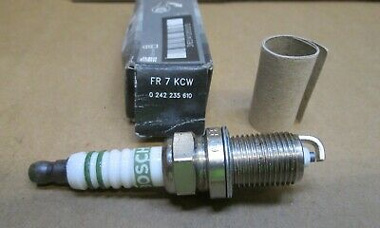
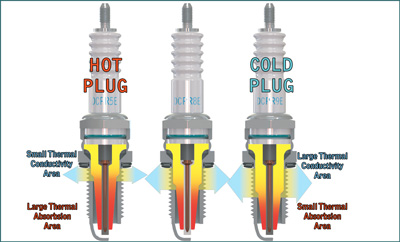
![White Ash on Spark Plug -[FIX Signs of Trouble + Causes]](https://torqueadvisor.com/wp-content/uploads/2022/04/White-Ash-on-Spark-Plug-1.jpg)